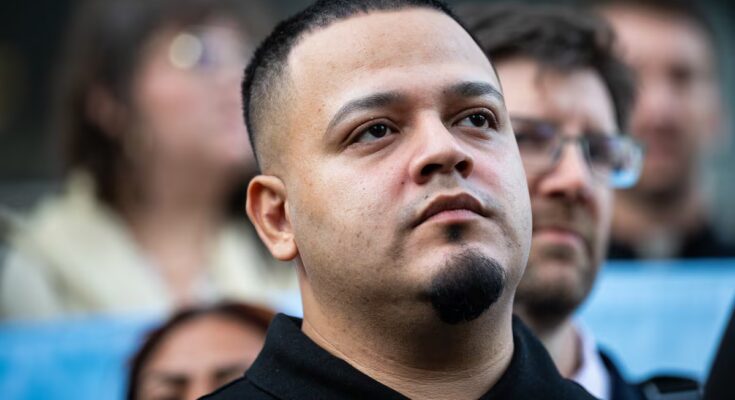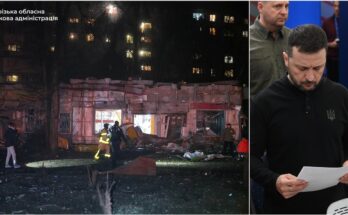Donald Trump’s administration once again failed this Thursday to provide explanations before a court about the fate it had foreseen for Kilmar Abrego García, the Salvadoran mistakenly deported last March. The senior official sent to testify in the Maryland court failed to explain to District Judge Paula Xinis why the government wants to send Abrego García to Liberia instead of Costa Rica, the only country where the Salvadoran has agreed to deport himself if necessary.
John Cantu, a senior Immigration and Customs Enforcement (ICE) official, admitted that he did not understand the entire statement he had signed about deportation to Liberia that a State Department lawyer had sent him. “It is now clear that this witness has no idea of the contents of the statement,” Xinis said. Even the government’s lawyers, in the previous hearing, failed to justify the plans they had for the Salvadoran. On that occasion they didn’t even know which country would accept it.
Xinis said Thursday will likely be the last hearing he will hold before making a decision on the case, for which there is no date. The judge will have to decide whether Abrego García, detained in an ICE detention center in Pennsylvania, should be released or not. Furthermore, he will decide whether to maintain the temporary block he imposed on his expulsion.
Leaving the courtroom, the defense lawyer, Simon Sandoval-Moshenberg, expressed confidence that the judge will respond to his request for habeas corpus and decide that “they cannot continue to keep him locked up needlessly.”
Since August, an order from Xinis has prevented the Trump government from deporting Abrego García from the United States. Earlier this month, the Administration urged Xinis to revoke the order and allow his transfer to Liberia, claiming it had received assurances from the African country that Ábrego García would not suffer persecution or torture. Previously, the Administration had already attempted to deport the Salvadoran to Ghana, Uganda and Swaziland, but was unable to reach an agreement with the governments of these countries.
Abrego García, a 30-year-old metalworker, became the symbol of the abuses committed by the Administration in its deportation campaign when he was mistakenly sent to El Salvador on March 15. Since then, the government has portrayed him as a criminal and kept him detained, away from the state of Maryland, where he lived with his family. In addition to the deportation case, he has an open criminal case for alleged human trafficking, which was decided in a Tennessee court and is expected to begin in January.
At Thursday’s hearing, Xinis interviewed a senior ICE official, who was unable to explain why Liberia was chosen and not Costa Rica, a destination that Abrego García was willing to accept if he were to be deported and which gave him guarantees of being admitted as a refugee.
The defense had already refused deportation to the proposed African countries due to the lack of guarantees they offered regarding respect for human rights and Abrego García had declared that he feared being sent there. According to the law, the detainee can refuse to be deported to a third country if he demonstrates that he is likely to suffer persecution in the place of destination. The lawyers criticize the fact that the Salvadoran had already accepted deportation to Costa Rica, a country that had given guarantees to welcome him as a refugee and which, initially, the government had offered as a destination option. The opposition of the authorities to the sending to the Central American country, which promised to respect his rights, demonstrates, according to his lawyers, the intention to punish Abrego García for having denounced the injustice of his deportation.
“This administration’s tactic now is to teach Kilmar a lesson and they are using our criminal legal system not only to discredit him, but to make sure he serves as an example,” Maryland Assembly Representative Gabriel Acevero said outside the courthouse. As is customary in the judicial hearings on Abrego García, several people demonstrated carrying signs reading “Free Kilmar” (Kilmar free).
Judge Xinis was the first to rule that Abrego García’s deportation was unjust, as he enjoyed judicial protection that prohibited his deportation to El Salvador. He ran away from there when he was 16 due to threats he received from the Barrio 18 criminal gang. In 2019, a judge granted him protection because he understood that Abrego García would suffer retaliation if he returned. In El Salvador he was locked up in the Cecot prison (Terrorism Confinement Center), where he was tortured.
After admitting that Abrego García’s deportation was an “administrative error”, the Government decided to demonstrate that the Salvadoran was not innocent and accused him of being part of the MS-13 criminal gang, something he has always denied.
The human trafficking charge was announced only when the Salvadoran was repatriated to the United States in June, nearly three months after he was imprisoned in El Salvador. Social, political and judicial pressure (including from the Supreme Court, which called for his return) meant that, despite its reluctance, the government returned Abrego García.
As soon as he set foot on American soil, however, he was arrested and taken to Tennessee to examine the human trafficking charges he is accused of. The prosecution uses as evidence the video of a traffic stop in 2022. Abrego García was driving a vehicle in which nine other people were traveling and who the Government assures were members of MS-13.
Federal district judge Waverly Crenshaw Jr., who is handling the case, put forward the idea that the treatment meted out to the Salvadoran did not meet legal criteria but rather vindictive criteria, a theory supported by the defense. The magistrate will hold a hearing in December to hear arguments from both sides, after acknowledging at an earlier hearing that there is “some evidence that the prosecution against him may be vindictive”.
The government’s deportation deals with so-called third countries have been challenged in court by human rights organizations, who have noted that some immigrants are being sent to countries with a long history of abuse. But in June, a divided Supreme Court allowed the immediate expulsion of immigrants to countries other than their countries of origin and with minimal notice.



